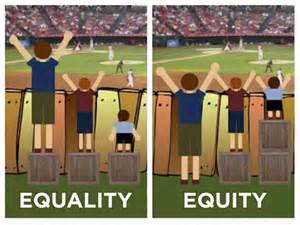The internet is ablaze today with news that the CEO of Gravity is raising the minimum wage in his company to $70,000, and dropping his own salary accordingly. I applaud the reasoning, and I realize he is not doing it as compensation exercise but rather to make a statement about how difficult it is to survive on minimum wage. I also realize we are probably not getting the full story, and it probably is not as simple as everyone who was under $70,000 being raised up to that number and anyone above that number remaining at their original compensation.
The above is my disclaimer. The rest of this blog is a commentary on why we should have compensation equity and not equality. Compensation is used to motivate employees and reward them for the value they bring to the company. If someone brings more value to the company, then reason suggests they should be compensated more than someone who brings less value to the company. This provides recognition for a job well done and a career path for those who want to provide more value to the company and earn more money. Paying everyone the same regardless of contribution to the company fails to recognize your A team, and depending on the individuals involved, does a disservice to the ones who are making considerably more than the market demands for their skill.
We saw this at Nortel, back in the day. Employees at Nortel were making a lot more money than their counterparts in other companies. While this was wonderful for them while they were there, it did an incredible disservice to them when Nortel started laying off people. Suddenly individuals who had built their lives on making a certain salary and were making life decisions accordingly, were out on the open market realizing that any equivalent position was paying up to 33% less.
From the company’s side of things, if you pay far more than the market is offering, you are stuck with these people. You will not have natural turnover which is, in fact, healthy and necessary for a company. No employee in their right mind who is earning $70,000 is going to take an equivalent position paying $45,000 no matter what the situation at their current employment is. People do want to earn what they are worth, and that goes both ways. Individuals who make more than they feel they are contributing do suffer from cognitive dissonance, and feel guilt. Not all, but certainly some!
Now having said all that, I would love to get my hands on the compensation plan this CEO has rolled out, I like to think everyone benefitted from his benevolence and not just the employees who were being paid less than $70,000.
The above is my disclaimer. The rest of this blog is a commentary on why we should have compensation equity and not equality. Compensation is used to motivate employees and reward them for the value they bring to the company. If someone brings more value to the company, then reason suggests they should be compensated more than someone who brings less value to the company. This provides recognition for a job well done and a career path for those who want to provide more value to the company and earn more money. Paying everyone the same regardless of contribution to the company fails to recognize your A team, and depending on the individuals involved, does a disservice to the ones who are making considerably more than the market demands for their skill.
We saw this at Nortel, back in the day. Employees at Nortel were making a lot more money than their counterparts in other companies. While this was wonderful for them while they were there, it did an incredible disservice to them when Nortel started laying off people. Suddenly individuals who had built their lives on making a certain salary and were making life decisions accordingly, were out on the open market realizing that any equivalent position was paying up to 33% less.
From the company’s side of things, if you pay far more than the market is offering, you are stuck with these people. You will not have natural turnover which is, in fact, healthy and necessary for a company. No employee in their right mind who is earning $70,000 is going to take an equivalent position paying $45,000 no matter what the situation at their current employment is. People do want to earn what they are worth, and that goes both ways. Individuals who make more than they feel they are contributing do suffer from cognitive dissonance, and feel guilt. Not all, but certainly some!
Now having said all that, I would love to get my hands on the compensation plan this CEO has rolled out, I like to think everyone benefitted from his benevolence and not just the employees who were being paid less than $70,000.


 RSS Feed
RSS Feed

